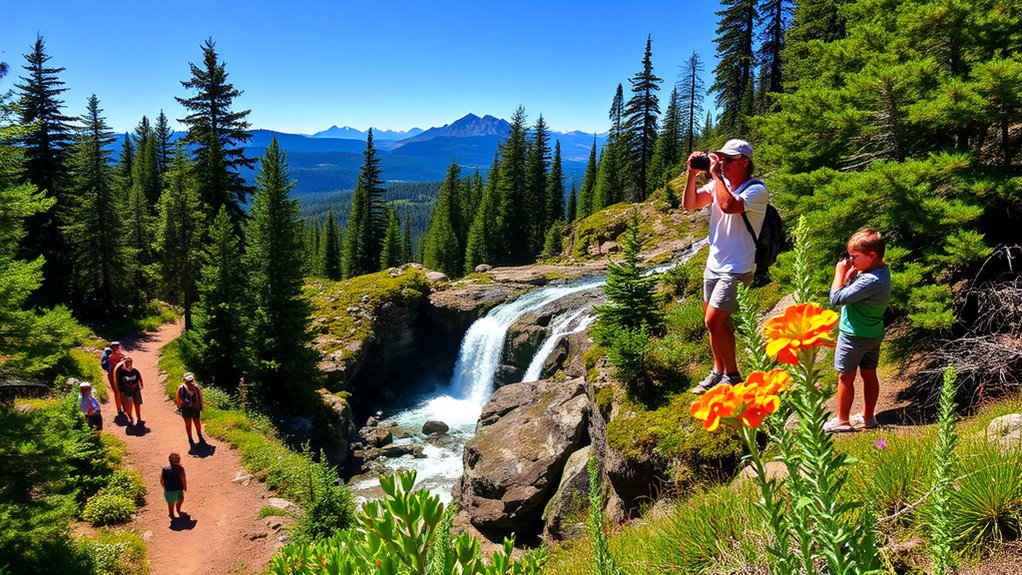To share spots ethically, follow local rules and respect signage, markings, and time limits. Park considerately without occupying excessive space or blocking others’ access. Show consideration by making small adjustments and double-checking your vehicle’s position before leaving. Practice patience and emotional awareness to foster a calm environment. Responsible sharing reduces frustration and promotes fairness for everyone. If you want to learn more about creating respectful shared spaces, keep exploring effective ways to contribute positively.
Key Takeaways
- Follow posted signs and designated parking zones to ensure fair and rule-abiding sharing.
- Avoid occupying multiple spaces or lingering beyond time limits to prevent unfairness.
- Park considerately, making small adjustments to maximize space for others.
- Show respect and consideration to foster community harmony and reduce conflicts.
- Leave the area clean and undamaged, maintaining accessibility and trust among users.

Sharing parking spots might seem simple, but doing it ethically requires awareness and respect for others. When you park in a shared space, it’s essential to follow basic principles like Leave No Trace and Respect Local Rules. Leaving no trace means you should leave the spot just as you found it—no trash, no damage, and no lingering belongings. It’s about ensuring that when you leave, the next person can enjoy the space just as much as you did. This shows consideration and helps maintain the area’s condition, preventing conflicts or complaints. Respecting local rules is equally vital, as these regulations are put in place to manage parking efficiently and fairly. Ignoring signage, time limits, or designated spots can cause frustration and unfair advantages.
When sharing spots, always check for signage or markings. For example, some areas have specific rules about overnight parking or restrictions during certain hours. By respecting these rules, you help keep the system fair. If you’re unsure about a rule, it’s better to ask or look for official guidelines rather than risk a fine or causing inconvenience to others. Being aware of local regulations also means understanding any special considerations in the area—such as permit requirements or seasonal restrictions. Ignoring these can lead to penalties and disrupt community harmony.
You should also be mindful of how you park. Avoid occupying multiple spaces if possible, and don’t take up more room than necessary. This consideration allows others to find parking easily and reduces frustration. If you’re parking in a busy or limited space, think about how your parking affects nearby drivers. Sometimes, a small adjustment in your parking position can make a big difference for someone else looking for a spot. When you leave, double-check that your vehicle isn’t blocking access or encroaching on neighboring spots. This simple act helps keep the flow smooth and avoids conflicts.
Additionally, understanding somatic therapy techniques can help manage stress and emotional responses related to conflicts over shared spaces, promoting a calmer community atmosphere. Sharing spots ethically is about more than just following rules; it’s about fostering respect and community. When everyone commits to Leave No Trace and respects local rules, parking becomes less stressful and more equitable. Remember, parking isn’t just a personal convenience—it’s a shared resource that requires cooperation. By being considerate and conscientious, you help maintain harmony and ensure that everyone can enjoy the space without unnecessary hassle. Practicing these principles not only benefits others but also reflects well on your character as a responsible member of your community.
Frequently Asked Questions
Can Sharing Spots Lead to Environmental Damage?
Sharing spots can definitely lead to environmental damage if you’re not careful. When more people visit, the urban impact increases, causing trail erosion and harming local ecosystems. You might unintentionally damage vegetation or disturb wildlife, especially if everyone doesn’t follow responsible practices. To protect these spots, share responsibly, stay on designated trails, and encourage others to do the same. That way, you help preserve the environment for future visitors.
Should I Share Secret or Sensitive Locations?
Think of secret spots as hidden treasures; sharing them can turn a delicate balance into chaos. You should avoid revealing sensitive locations because of privacy concerns and personal safety risks. Spreading such spots is like opening Pandora’s box—once out, it’s hard to control. Protect your privacy and safety by keeping these places to yourself, ensuring they stay special and undisturbed for your own and others’ well-being.
How Do I Handle Conflicts Over Shared Spots?
When conflicts arise over shared spots, you should prioritize respecting community boundaries and local customs. Talk openly with others involved, listen to their concerns, and seek mutually agreeable solutions. Always stay considerate of the environment and cultural norms, and avoid escalating tensions. By showing respect and understanding, you help foster a positive atmosphere, ensuring everyone can enjoy the spot responsibly and harmoniously.
Is It Ethical to Share Spots With Non-Enthusiasts?
Sharing spots with non-enthusiasts is like opening a garden to neighbors; trust boundaries and consent importance matter. If you respect their limits and guarantee they understand the spot’s significance, it’s ethical. However, if you ignore boundaries or risk damaging the spot, it’s not. You hold the responsibility to protect the spot’s integrity, so always consider if sharing aligns with mutual trust and respect.
What Are Legal Considerations When Sharing Spots?
When sharing spots, you need to consider private ownership and trespassing laws. Always ensure you have permission from landowners before entering private property, as trespassing laws can lead to fines or legal action. Respect posted signs and boundaries, and avoid sharing exact locations that could result in damage or overuse. Being aware of these legal considerations helps protect both your access and the environment, ensuring responsible sharing.
Conclusion
As you stand on the edge of that quiet trail or pristine surf spot, remember your choices echo beyond your moment. Sharing ethically means leaving footprints light and waters clear, like a gentle breeze guiding others to the same hidden gem. Respect the land and waves, so future adventurers can also chase the thrill. When you act kindly, you become part of a story where nature’s beauty remains vibrant, inviting all to experience its magic without scars.










